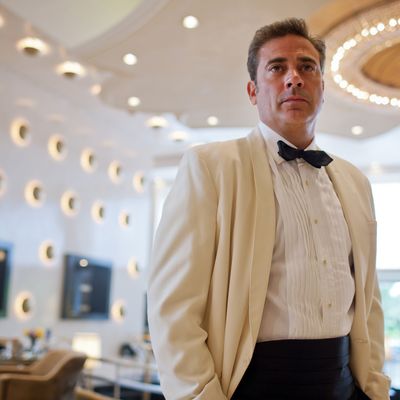
The new Starz drama Magic City, a macho soap opera set in sex-glamour-and-revolution-rocked 1958 Miami, cries out for one of those bitchy one- or two-sentence reviews that music critics sometimes write when they really hate a new album. (My favorite is my old Dallas Observer colleague Robert WilonskyÔÇÖs review of the Black CrowesÔÇÖ The Southern Harmony and Musical Companion: ÔÇ£I seem to recall loaning this album to a friend in 1974 and not asking for it back.ÔÇØ) But the show is so enervating and undeservedly full of itself, and such an altogether depressing combination of brilliant production values and subpar drama, that I canÔÇÖt muster the necessary bile.
The latest in a seemingly endless series of dramas that desperately want to be the next The Sopranos ÔÇö my former Vulture colleague Willa Paskin has memorably dubbed such shows ÔÇ£FauxpranosÔÇØ ÔÇö itÔÇÖs got all the necessary components but fails to assemble them in a lively and original way. The show just lies there and dies there. I got about midway through the second episode and thought, This show could rally and eventually amount to something, but lifeÔÇÖs too short to stick around and find out. IÔÇÖd rather rewatch The Godfather, Part II or the first season of Michael MannÔÇÖs great and still-underappreciated period drama Crime Story, both of which seem to have influenced Magic City. The pastel skies, the bright blue water, the sexy young women in their tight two-piece bathing suits, the sleek hunks with their skinny ties and cigarettes, the backroom plots and nasty murders, should all be electrifying, or at least pleasurable. But they feel like disconnected affectations in search of a purpose.
The showÔÇÖs Tony Soprano/Al Swearengen/Don Draper antihero is Ike Evans (Jeffrey Dean Morgan), a hotel owner whoÔÇÖs not as sweet and bland as he initially seems. When our story opens on New YearÔÇÖs Eve, 1958, IkeÔÇÖs freaking out because Frank Sinatra is set to perform at his private kingdom, the Miramar, and a hotel workersÔÇÖ strike is keeping liquor and other precious supplies from entering the grounds. What to do about the intractable labor union leader who wants IkeÔÇÖs employees to unionize? Really, now. We all saw the first Godfather, and we also saw the opening dream sequence in which Ike pictures the bodies of previously murdered enemies floating in brackish water. We know itÔÇÖs only a matter of time before Ike or an underling makes the union guy an offer he canÔÇÖt refuse, or just straight up murders him. But the pilot takes forever to bring us to that point, and acts as if itÔÇÖs a profound decision on IkeÔÇÖs part when anybody whoÔÇÖs seen this type of character in a gangster film knows that kind of subplot canÔÇÖt possibly resolve itself peacefully.
On the personal end of things, IkeÔÇÖs an assimilated Jew whose family is even more mainstream in its presentation and value system. He has two adult sons, a straitlaced law student Danny (Christian Cooke) and a more gangsterish type named named Stevie (Steven Strait), whoÔÇÖs first seen getting head while driving a vintage convertible through Miami. (The show has a knack for introducing characters with sleazy flourish, IÔÇÖll give it that.) Ike also has a beautiful young second wife named Vera (Olga Kurylenko), who wants to convert to Judaism to fit in, a Cuban right-hand man (Yul V├ízquez) whoÔÇÖs worried about getting loved ones out of BatistaÔÇÖs soon-to-be-Castro-ized Cuba, and a father (Alex Rocco) whoÔÇÖs amusingly described in a later episode as the worst Jew in Miami. (HeÔÇÖs a leftist atheist who reads revolutionary literature; in 1958 Greenwich Village, heÔÇÖd have been considered a tad boring.)
IkeÔÇÖs business partner Ben the Butcher, a psycho played by the instantly creepy and effortlessly hate-able Danny Huston, wants full ownership of the hotel in exchange for solving IkeÔÇÖs labor troubles. BenÔÇÖs previous two wives both mysteriously died in childbirth, and now heÔÇÖs carrying on with Lily (Jessica Marais), a twentysomething vixen who hangs out in smoky cocktail lounges and takes an instant liking to Stevie. And by ÔÇ£liking,ÔÇØ I mean ÔÇ£film noir urge to rut.ÔÇØ
The only good scene in the pilot, which was directed by the excellent filmmaker Carl Franklin (Devil in a Blue Dress), is the one that introduces Lily as she coaches a torch singer. Franklin shows her hand touching FrankieÔÇÖs hand, then pans up to her face, an old-movie flourish that of a sort that Magic City could use more of. Franklin would have been a great director for the forties studio era; he has a knack for adding poetry to tediously prosaic material. But he canÔÇÖt energize scenes that were conceived with no imagination, and the showÔÇÖs characters are mostly cutouts. There isnÔÇÖt a single woman with more than one dimension; at least the men have two. I wish series creator Mitch Glazer, who was born in┬áMiami around the same time as the dramaÔÇÖs events and was the son of an electrical engineer at the Miramar, had given up trying to add something new to the historical soap or the gangster picture, two modes he adores but doesnÔÇÖt have much feel for, and just wallowed in the posturing and atmosphere.
Magic City has guilty pleasure potential, but itÔÇÖs neither guilty nor pleasurable enough. It just lies there under the hot sun, occasionally rousing itself to turn over or refill its drink. ItÔÇÖs the kind of show in which a character tells the parable of the scorpion and the frog and acts as if weÔÇÖve never heard it before. Yes, really.


